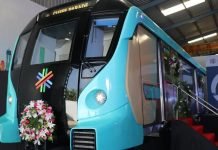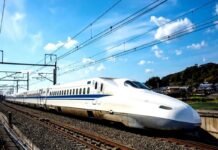Thiruvananthapuram: Principal adviser to Delhi Metro Rail Corporation (DMRC) E Sreedharan said that DMRC has no interest in light metro project and is continuing because of the pressure from chief minister Oommen Chandy. In a meeting organized by Trivandrum development authority (TRIDA) to clear doubts about the light metro project, Sreedharan said that it was not a business for DMRC, but a service.
The seminar moderated by Inkel chairman T Balakrishnan was an invite-only function, attended mostly by representatives of organizations which are strongly in favour of DMRC taking up the project on a nomination basis. Though the seminar was organized to clear doubts about the project, invited participants didn’t take the risk to level displeasing questions. At the outset of the discussion itself, veteran BJP leader O Rajagopal and the representative from CII said there was no need to go into technical specifications in the detailed project report (DPR), which had been severely criticized.
Rather than debating ambiguous clauses, most of the participants hailed Sreedharan’s contributions and pleaded him not to abandon the project.
When raised question about the need for a global tender, Sreedharan said that government could go for global tender, but DMRC won’t participate. “DMRC has a policy that we don’t participate in tender,” he said.
When asked whether charging 6% of project cost as consultancy fee was higher compared to global rates, he said that 6% was not a big amount considering the benefits of DMRC becoming the turnkey consultant. “The companies would quote lesser amount because they have good faith in DMRC. The project will be completed in short span on time,” he said.
Sreedharan said that the major drawback of engaging foreign consultants is that the project would get delayed.
During the discussion, Sreedharan said that the same technology of metro rail will be used for light metros. “The only difference is that it will have fully motorized bogies,” he said. When probed the cost of the motorized bogies about which there is no mention in the DPR, moderator intervened stating that such details are immaterial.
Interestingly, Sreedharan said that a depot was not necessary to operate light metro on the Kesavadasapuram-Karamana stretch. “Yes, we have the technical advancement to operate light metro without a depot on the stretch. Only temporary facilities are required. Our bogies are so advanced that they won’t require any maintenance work for three years,” he said.
When youth commission member Swapna George asked whether fuel cess would be a burden for the people at a time when the state government has already introduced Rs.1 cess for fuel in the recent budget, Sreedharan said that cess was suggested so that Union government would get an assurance about how state government raise money for the project. He said it won’t be a burden for people as they are for better facilities.
“Raising Rs 200 crore per year for the state with an annual budget of Rs 1 lakh crore is not a big issue,” he said.
Sreedharan said that though financial internal rate of returns (FIRR) is low, economic internal rate of returns (EIRR) is high. “EIRR is calculated considering social benefits such as saving of fuels, time, lives, prevention of environmental pollution, etc. The EIRR calculated is 18%, which is important,” he said. Sreedharan said that return of loan worth Rs 2,300 crore was not a concern as companies which operate the light metro could pay back the amount from their revenue.
Will the State allocate Rs. 324 crore annually for five years for the Light Metro project in the two cites ?
buy renova online blackmenheal.org/wp-content/language
. A reply to this question is what the elected representatives, people, DMRC and the project officials are anxiously awaiting from the government.
The Rs.324 crore yearly outgo of the State includes Rs.200 crore for the capital city and Rs.124 crore for Kozhikode. When the project is executed fully in 2021, this will come to Rs.1,619 crore out of a completion cost of Rs.6,728 crore. The Rs.1,619 crore as State share (20 per cent) includes the equity of Rs.869 crore, Rs.409 crore (sub debt for central taxes) and Rs.361 crore as sub debt for land. “Why can’t the State with a budget of Rs. one lakh crore spare Rs.200 crore annually for the capital ?,’’asks DMRC Principal Adivser E.Sreedharan.
The Centre’s share (20 per cent) projected by the DMRC is Rs.1,278 crore with yearly outgo of Rs.256 crore for two cities. The remaining Rs.3,831 crore (60 per cent) is to be mobilised through loans locally or from external funding agencies.







